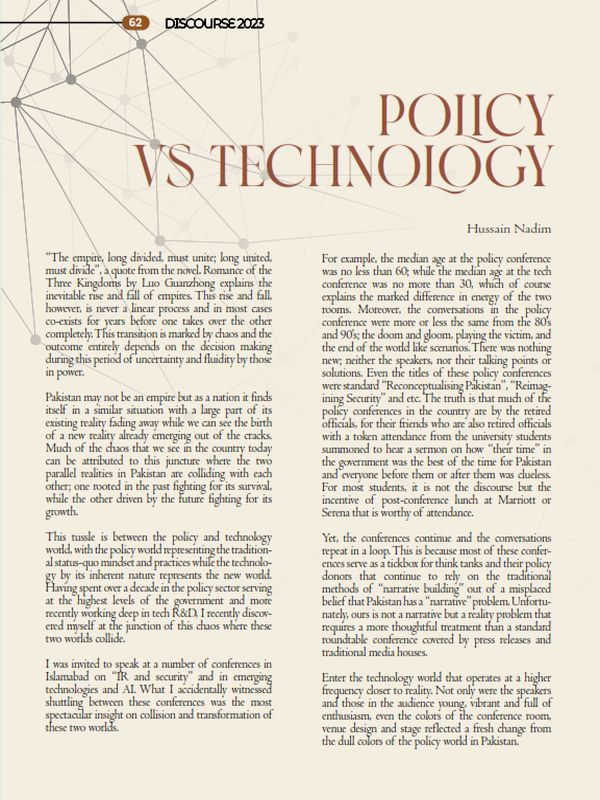Policy vs Technology
“The empire, long divided, must unite; long united, must divide”, a quote from the novel, Romance of the Three Kingdoms by Luo Guanzhong explains the inevitable rise and fall of empires. This rise and fall, however, is never a linear process and in most cases co-exists for years before one takes over the other completely. This transition is marked by chaos and the outcome entirely depends on the decision making during this period of uncertainty and fluidity by those in power.
Pakistan may not be an empire but as a nation it finds itself in a similar situation with a large part of its existing reality fading away, and with the birth of a new reality emerging out of the cracks. Much of the chaos that we see in the country today can be attributed to this juncture where the two parallel realities in Pakistan are colliding with each other; one rooted in the past fighting for its survival, the other driven by the future fighting for its growth.
This tussle is between the policy and technology world, with the policy world representing the traditional status-quo mindset and practices and technology by its inherent nature representing the new world. Having spent over a decade in the policy sector serving at the highest levels of the government and more recently working deep in tech R&D, I recently discovered myself at the junction of this chaos where these two worlds collide.
I was invited to speak at a number of conferences in Islamabad on ‘IR and security’ and in emerging technologies and AI. What I accidentally witnessed shuttling between these conferences was the most spectacular insight on collision and transformation of these two worlds.
For example, the median age at the policy conference was no less than 60; while the median age at the tech conference was no more than 30, which of course explains the marked difference in energy of the two rooms. Moreover, the conversations in the policy conference were more or less the same from the 80s and 90s; the doom and gloom, playing the victim, and doomsday scenarios. There was nothing new; neither the speakers, nor their talking points or solutions. Even the titles of these policy conferences were standard ‘Reconceptualising Pakistan’, ‘Reimagining Security’, and so forth. The truth is that much of the policy conferences in the country are conducted by retired officials, primarily for their friends who are also retired officials, and with a token attendance from university students summoned to hear a sermon on how ‘their time’ in the government was the best for Pakistan and everyone before them or after them was/is clueless. For most students, it is not the discourse but the incentive of post-conference lunch at Marriott or Serena that makes it worth attending.
Yet, the conferences continue and the conversations repeat in a loop. This is because most of these conferences serve as a tick-box for think tanks and their policy donors that continue to rely on the traditional methods of ‘narrative building’ out of a misplaced belief that Pakistan fundamentally suffers from a narrative problem. Unfortunately, ours is not a narrative but a reality problem that requires more thoughtful treatment than the standard roundtable conference covered by press releases and traditional media houses.
Enter the technology world that operates at a higher frequency closer to reality. Not only were the speakers and those in the audience young, vibrant and full of enthusiasm, even the colours of the conference room, venue design and stage reflected a fresh change from the dull colours of the policy world in Pakistan. The most striking difference, as expected, was the conversations in the tech conference which were all around new ideas, tech based solutions, emerging opportunities, the new world powered by AI and blockchain, and how Pakistan can integrate into the global tech race, etc. What I felt at the tech sessions was hope, enthusiasm and drive to pursue greatness: something that is strangely well insulated from the doom and gloom of the policy sector and the national debate at large.
Essentially, the tech world speaks a different language, wears a different lens, and lives an entirely different reality that by its inherently decentralized structure has challenged the status-quo of the policy world. Unfortunately, instead of undertaking reforms and embracing technology as a potential Noah’s Ark for Pakistan, the policy world is coming to see tech and youth as a ‘national security’ problem. Hence; the layers of NOC’s, arbitrary banning of apps, and repeated assertions that ‘youth’ is naive and impressionable.
What the policy leaders fail to recognize is that no matter the dilatory tactics, the traditional policy world as it is right now is fading on its own, unable to keep up with the changing times. The question is if it will take down the entire country with it? Great nations emerge out of great decisions during periods of chaos; for Pakistan to start new and grow, the technology world must prevail.
The author is a Fellow at the Transformations of the Human (TotH) at the Berggruen Institute, a Los Angeles based think tank.




